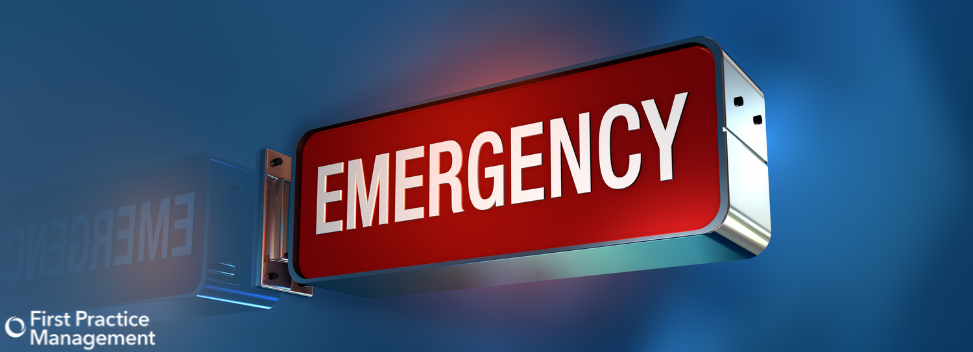
Every year NHS England requires GP Practices to formally confirm that they are prepared to respond to emergencies as an annual assurance process for Emergency Preparedness, Resilience, and Response (EPRR).
In accordance with NHS England's EPRR Framework, those responsible for providing and overseeing NHS-funded services need to demonstrate their ability to effectively respond to major, critical and business continuity incidents whilst maintaining services to patients.
Why is it Important?
EPRR is the process of preparing for, responding to, and recovering from emergencies. It is important for all organisations, including GP practices, to have an EPRR plan in place so they can continue to provide essential services to their patients in the event of an emergency. It can minimise disruption to services and ensure that patients can continue to access the care they need.
NHS-funded providers are usually required to undertake an annual self-assessment against the full set of core standards for EPRR. Assessing your GP practice’s compliance against these standards demonstrates your level of preparedness.
Where do I start?
Use a risk assessment or checklist to identify all of the potential risks that could affect your practice. This includes both internal risks, such as a fire or a power outage, and external risks, such as a pandemic or a major weather event. Once the risks have been identified, assess the likelihood and impact of each risk. This will help you to prioritise the risks and to develop appropriate mitigation strategies.
Develop a plan for mitigating each of the risks that have been identified. This plan should include steps to reduce the likelihood of the risk occurring, as well as steps to minimise the impact of the risk if it does occur.
Regularly review and update the risk assessment and mitigation plans. This will ensure that they remain relevant and effective in the light of the latest threats and challenges. Share the risk assessment and mitigation plans with staff and patients, so everyone is aware of the risks that the practice faces and the steps that are being taken to mitigate those risks.
Can ICBs and PCNs help with the EPRR process?
Integrated Care Boards (ICBs) and Primary Care Networks (PCNs) can play a key role in supporting GP practices with their EPRR planning and implementation. ICBs can provide GP practices with access to resources and expertise, such as EPRR templates and training. ICBs can also coordinate EPRR planning across the local health and care system. PCNs can provide a forum to share best practices and collaborate on EPRR planning. PCNs can also help practices to develop joint EPRR plans.
GP practices can get involved with their local ICB and PCN in EPRR by:
- Attending EPRR training provided by the ICB or PCN.
- Participating in EPRR planning meetings and exercises.
- Sharing information and resources with the ICB and PCN.
- Developing joint EPRR plans with other GP practices in the PCN.
For the 2023/24 EPRR annual assurance process, NHS England has provided guidance and a self-assessment tool that contains essential standards. They've communicated these details in a letter addressed to commissioners and providers of NHS-funded services. This process helps ensure that our healthcare system remains ready and resilient in the face of unexpected events while continuing to deliver care to patients.
The NHS document "Emergency Preparedness, Resilience and Response (EPRR) Framework" provides a number of examples of activities that GP practices can undertake to improve their EPRR. These include:
- Business continuity planning (BCP): Developing a BCP to ensure that the practice can continue to operate in the event of an emergency.
- Risk assessment: Identifying and assessing the potential threats and vulnerabilities of the practice.
- Emergency response planning: Developing plans for responding to different types of emergencies, such as fire, flooding, and power outages.
- Staff training: Providing training to staff on emergency response procedures and communication skills.
- Communication planning: Developing a plan for communicating with patients and staff during and after an emergency.
- Exercising and testing EPRR plans: Regularly testing and exercising EPRR plans to ensure that they are effective.
Here are some examples of evidence that a GP practice could provide to show compliance with the requirements for joint EPRR planning:
- A copy of the joint EPRR plan, signed and dated by the practice manager and by representatives from other participating organisations.
- A record of joint EPRR planning meetings and exercises, including attendance lists and meeting minutes.
- A record of communication between the GP practice and other participating organisations, such as emails and letters.
- A record of the GP practice's contributions to the development and implementation of the joint EPRR plan.
GP practices should also be prepared to provide evidence of their joint EPRR planning to the Care Quality Commission (CQC) during inspections.
Download your free EPRR Summary Checklist today and ensure that your practice is prepared for any emergency. The checklist covers all aspects of EPRR, including preparedness, resilience, response, and recovery.
FPM Members can also download our EPRR Policy and an EPRR Comprehensive Checklist Guide from our FPM Core database.


0 Comments